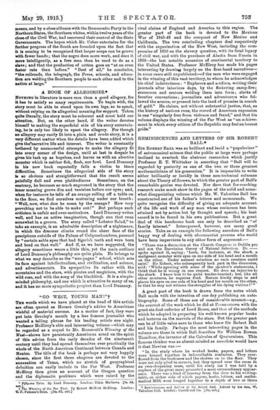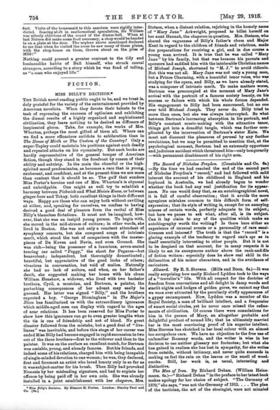REMINISCENCES AND LETTERS OF SIR ROBERT BALL!
Six ROBERT Bum was so brilliant and lucid a "popularizer" of astronomical science that the public at large were perhaps inclined to overlook the abstruse researches which justify Professor E. T. Whittaker in asserting that "Ball will be regarded by posterity as one of the two or three greatest mathematicians of his generation." It is impossible to write either brilliantly or lucidly in these non-technical columns about the Theory of Screws, to which the greater part of Ball's remarkable genius was devoted. Nor does that far-reaching research make much show in the pages of the solid and some- what disappointing volume which Mr. W. Valentine Ball has constructed out of his father's letters and memoranda. We quite recognize the difficulty of giving an adequate account of the life and work of any man whose eminence has been attained not by action but by thought and speech ; his best record is to be found in his own publications. But a great deal of this handsome book can only be described as "of family interest." Interspersed, however, are many good stories. Take as an example the following anecdote of Ball's happy way of dealing with obscurantist persons who would have been impervious to any other form of argument "There was a discussion at the Church Congress in Dublin pro and con the Darwinian theory of Natural Selection. Dr. - epoke against it, saying : 'Look, for instance, at the shark, a malignant monster with eyes on one side of his head and a mouth on the other. Under natural selection no such creature could exist? Sir Robert, who subsequently took part in the discussion, said: 'While agreeing with some of the speaker's statements, I think that he is wrong in one respect. He does an injustice to the shark. I know him to be quite tender-hearted t but, like all other creatures, he requires food. Nature kindly stops in and places his eyes on one side of his head and his mouth on the other, so that he may not witness the struggles of his dying victims I' " A great part of the book is drawn from the notes which Ball made with the intention of one day publishing an auto- biography. Some of these are of considerable interest—e.g., the account of the work which be did at Pal sonstown with the great six-foot reflector of Lord Rome, and that of the methods which he adopted in preparing his well-known popular books and lectures on the marvels of the stars. But the greater part can be of little value save to those who knew Sir Robert Ball and his family. Perhaps the most interesting pages in the volume are those in which Ball describes Sir William Rowan Hamilton, the inventor of the Calculus of Quatemiona. This famous thinker was as absent-minded as anecdote would have it that Newton was :— " In the study where he worked books, papers, and letters were heaped together in indescribable confusion. They over- flowed from the bookcases and the shelves on to the floor. They were not only piled in corners, but they spread over the room in an ever-deepening mass, until his study (as I was told by a nephew of the great man) presented a most extraordinary appear- Arica There was a kind of laneway from the door to his writing- table, on either side of which papers, books, letters, and mathe- matical MSS. were heaped together to a depth of two or three • Reftioiscrotos and laltors of Sir Robert Ball. Edited by his bens We Yalu:tine DO. Loudon: clean and Co. pis. act)
feet. Visits of the housemaid to this sanctum were rigidly inter- dicted. Soaring aloft in mathematical speculation, Sir William was utterly oblivious of the sound of the dinner-bell. When at last Nature did make some food necessary, a chop would be handed in on a plate at the door. The nephew above mentioned declared to me that when he visited the room he saw many of these plates, with the chop-bones on them, thrown about on the piles of
MSS!"
Nothing could present a greater contrast to the tidy and businesslike habits of Ball himself, who struck casual strangers, according to a story which he was fond of telling, as "a man who enjoyed life."



































 Previous page
Previous page